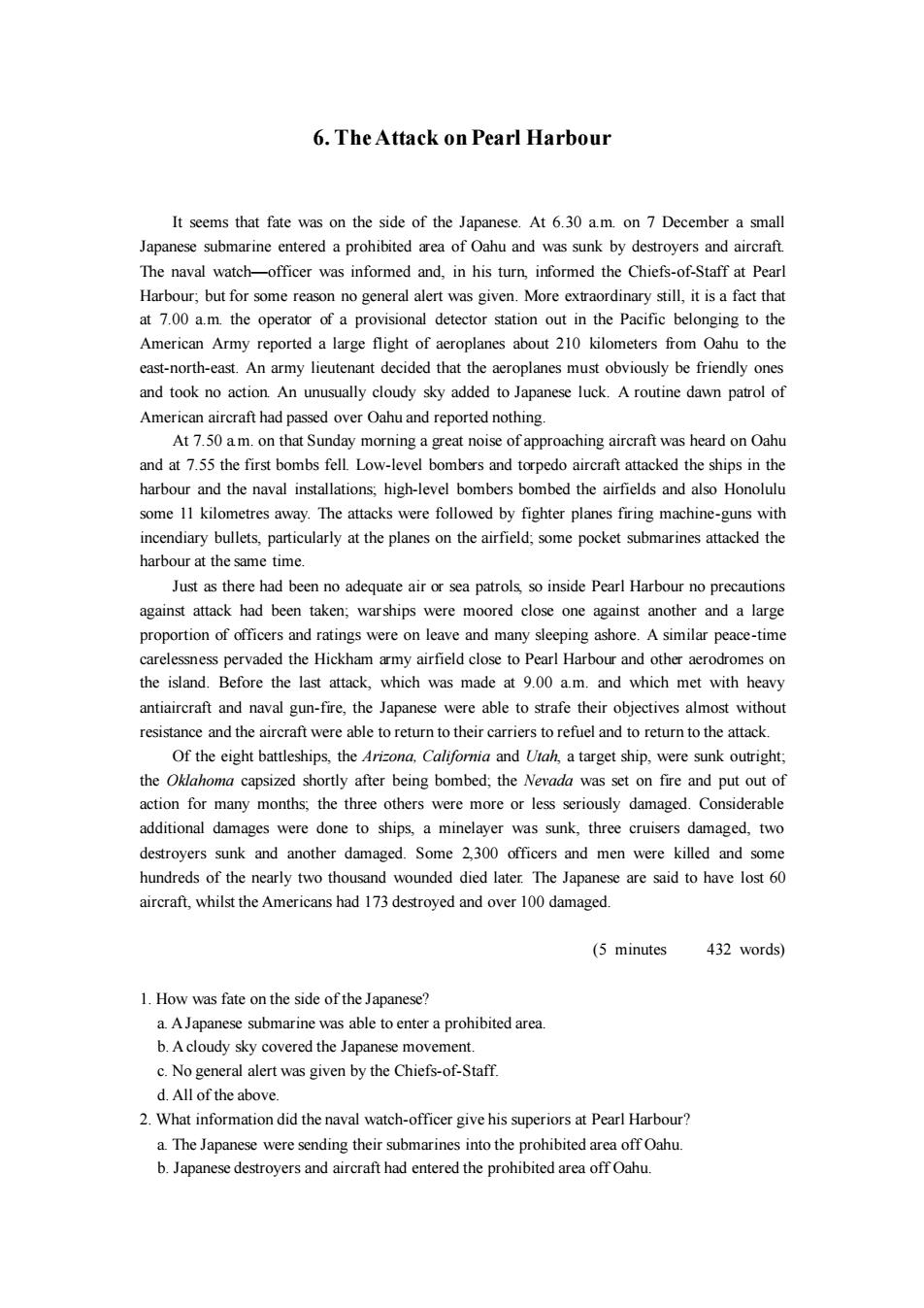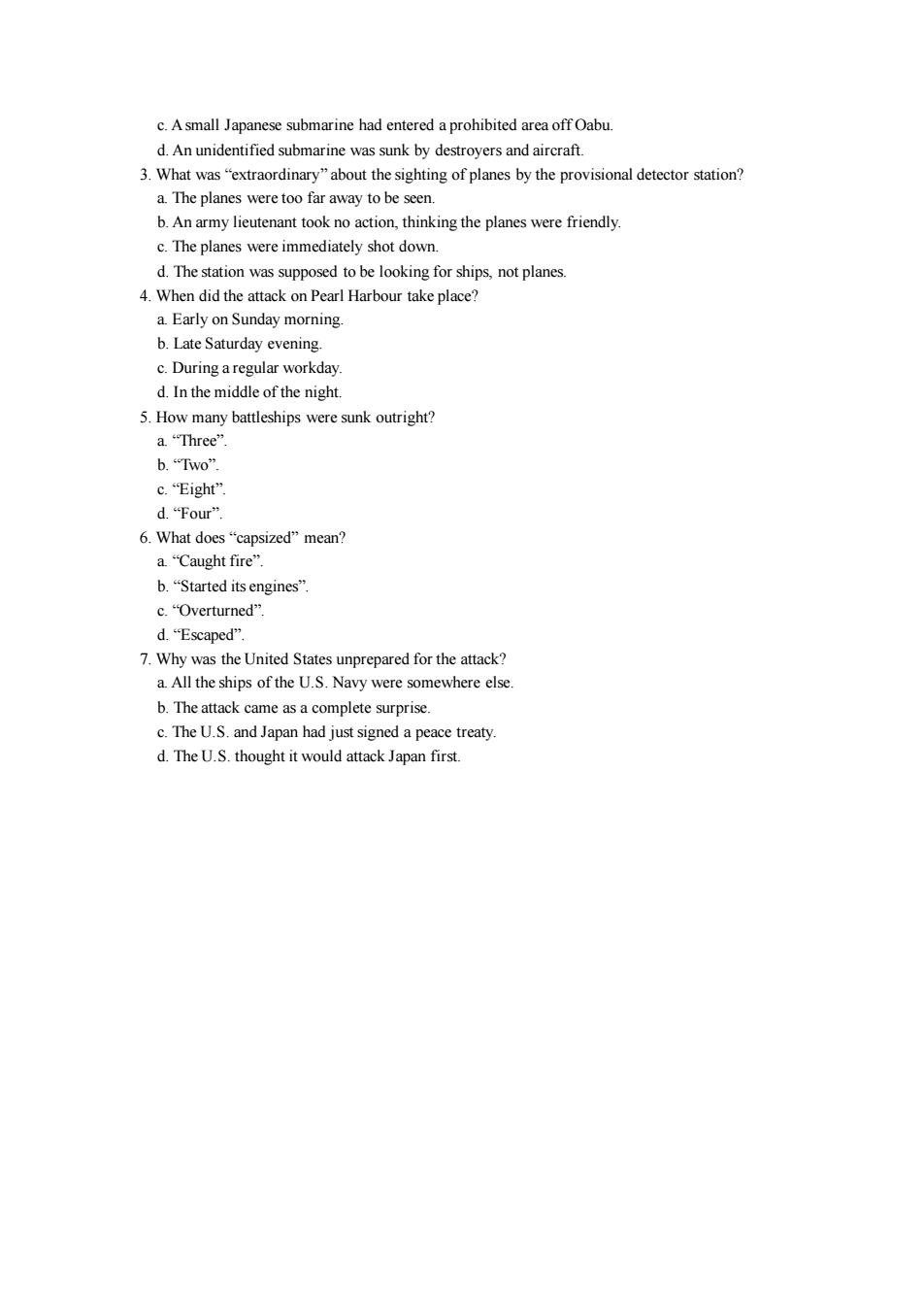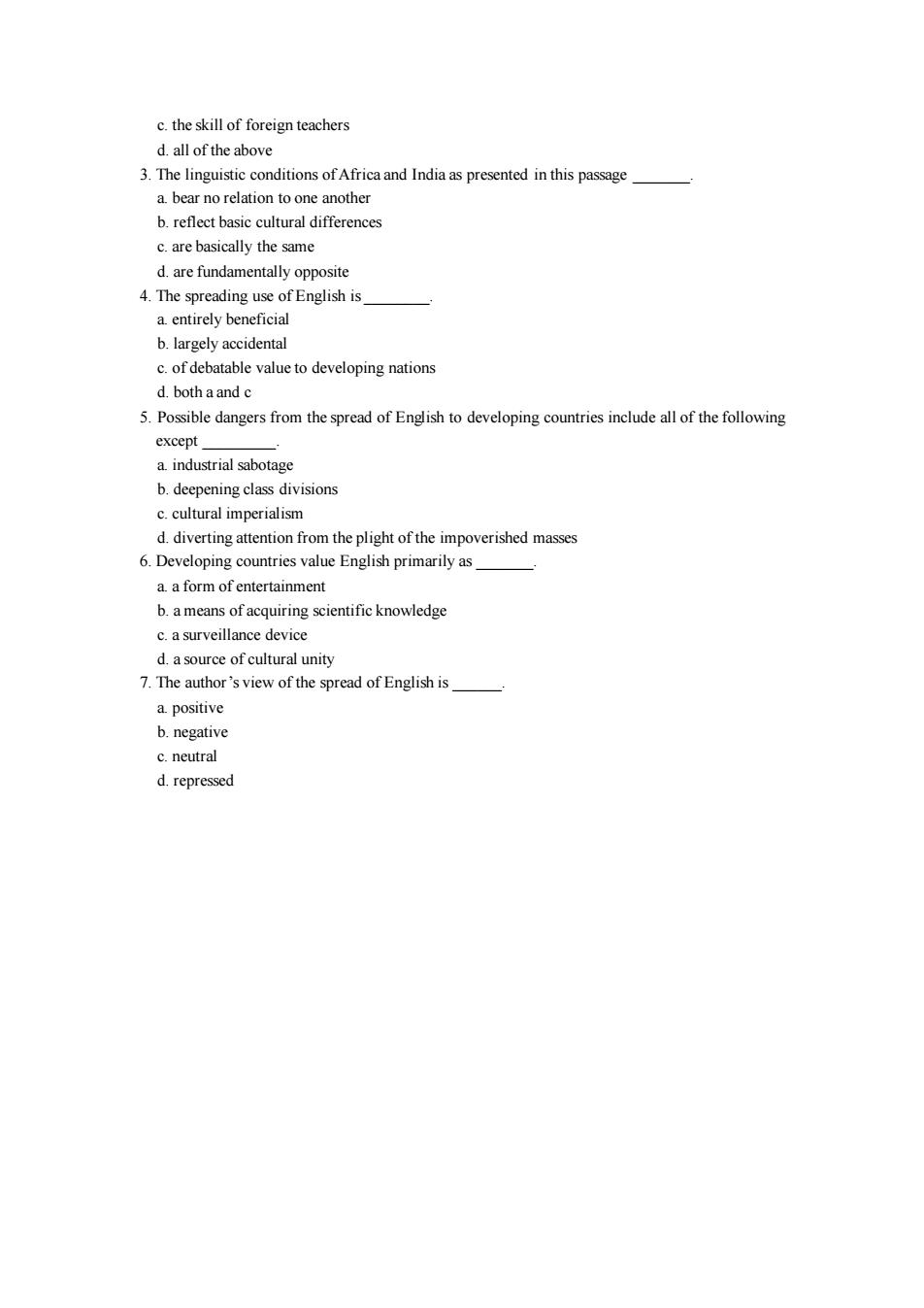
6.The Attack on Pearl Harbour It seems that fate was on the side of the Japanese.At 6.30 am.on 7 December a small Japanese submarine entered a prohibited area of Oahu and was sunk by destroyers and aircraft The naval watchofficer was informed and,in his turn informed the Chiefsof-Staff at Pearl Harb our,but for me reo no general alert was given.Morex rdinary still,it is fact th at 7.00 a.m the operator of a provisional detector station out in the Pacific belonging to the American Army reported a large flight of acroplanes about 210 kilometers from Oahu to the east-north-east.An army lieutenant decided that the aeroplanes must obviously be friendly ones and took no action.An unusually cloudy sky added to Japanese luck.A routine dawn patrol of Amer over Oahu u and At7.that Sunday nose of approaching aircraft was and at 7.55 the first bombs fell.Low-level bombers and torpedo aircraft attacked the ships in the harbour and the naval installations,high-level bombers bombed the airfields and also Honolulu some 11 kilometres away.The attacks were followed by fighter planes firing machine-guns with ncendiary bullets,particularly at the planes on the airfield. ocket su harbour at th Just as there had been no adequate air or sea patrols so inside Pearl Harbour no precautions against attack had been taken:warships were moored close one against another and a large proportion of officers and ratings were on leave and many sleeping ashore.A similar peace-time carelessness pervaded the Hickham army airfield close to Pearl Harbour and other aerodromes on the island.Before the last attack ich wa made at 9.00 which met vith antiaircraft and naval gun-fire,the Japanese were able to strafe their objectives almost without resistance and the aircraft were able to return to their carriers to refuel and to return to the attack Of the eight battleships,the Arizona.Califomia and Utah,a target ship,were sunk outright. the Oklahoma capsized shortly after being bombed,the Nevada was set on fire and put out of action for many months,the three t were more or less seriously damaged Considerable additional damages were done to ships,a minelaye was sunk. three cruisers maged,two destroyers sunk and another damaged.Some 2300 officers and men were killed and some hundreds of the nearly two thousand wounded died later The Japanese are said to have lost 60 aircraft.whilst the Americans had 173 destroved and over 100 damaged. (5minutes 432 words) 1.How was fate on the side of the Japanese? a.AJapanese submarine was able to enter a prohibited area. b.A cloudy sky covered the Japanese movement. e no ge eral alert was given by the Chiefs-of-Staff d.All of the above 2.What information did the naval watch-officer give his superiors at Pearl Harbour? a.The Japanese were sending their submarines into the prohibited area offOahu. b.Japanese destroyers and aircraft had entered the prohibited area offOahu
6. The Attack on Pearl Harbour It seems that fate was on the side of the Japanese. At 6.30 a.m. on 7 December a small Japanese submarine entered a prohibited area of Oahu and was sunk by destroyers and aircraft. The naval watch—officer was informed and, in his turn, informed the Chiefs-of-Staff at Pearl Harbour; but for some reason no general alert was given. More extraordinary still, it is a fact that at 7.00 a.m. the operator of a provisional detector station out in the Pacific belonging to the American Army reported a large flight of aeroplanes about 210 kilometers from Oahu to the east-north-east. An army lieutenant decided that the aeroplanes must obviously be friendly ones and took no action. An unusually cloudy sky added to Japanese luck. A routine dawn patrol of American aircraft had passed over Oahu and reported nothing. At 7.50 a.m. on that Sunday morning a great noise of approaching aircraft was heard on Oahu and at 7.55 the first bombs fell. Low-level bombers and torpedo aircraft attacked the ships in the harbour and the naval installations; high-level bombers bombed the airfields and also Honolulu some 11 kilometres away. The attacks were followed by fighter planes firing machine-guns with incendiary bullets, particularly at the planes on the airfield; some pocket submarines attacked the harbour at the same time. Just as there had been no adequate air or sea patrols, so inside Pearl Harbour no precautions against attack had been taken; warships were moored close one against another and a large proportion of officers and ratings were on leave and many sleeping ashore. A similar peace-time carelessness pervaded the Hickham army airfield close to Pearl Harbour and other aerodromes on the island. Before the last attack, which was made at 9.00 a.m. and which met with heavy antiaircraft and naval gun-fire, the Japanese were able to strafe their objectives almost without resistance and the aircraft were able to return to their carriers to refuel and to return to the attack. Of the eight battleships, the Arizona, California and Utah, a target ship, were sunk outright; the Oklahoma capsized shortly after being bombed; the Nevada was set on fire and put out of action for many months; the three others were more or less seriously damaged. Considerable additional damages were done to ships, a minelayer was sunk, three cruisers damaged, two destroyers sunk and another damaged. Some 2,300 officers and men were killed and some hundreds of the nearly two thousand wounded died later. The Japanese are said to have lost 60 aircraft, whilst the Americans had 173 destroyed and over 100 damaged. (5 minutes 432 words) 1. How was fate on the side of the Japanese? a. A Japanese submarine was able to enter a prohibited area. b. A cloudy sky covered the Japanese movement. c. No general alert was given by the Chiefs-of-Staff. d. All of the above. 2. What information did the naval watch-officer give his superiors at Pearl Harbour? a. The Japanese were sending their submarines into the prohibited area off Oahu. b. Japanese destroyers and aircraft had entered the prohibited area off Oahu

c.asmall japanese submarine had entered a prohibited area off Oabu d.An unidentified submarine was sunk by destroyers and aircraft 3.What was"extraordinary"about the sighting of planes by the provisional detector station? a.The planes were too far away to be seen. b.An army lieutenant took no action,thinking the planes were friendly c.The planes were immediately shot down. d.The station was supposed tob ookin for shipsnot planes 4.When did the attackon Pearl Harbour take place? a.Early on Sunday morning b.Late Saturday evening. c.During a regular workday d.In the middleof the nigh How many a."Thre b."Two" c."Eight" d.“Four" 6r b."Started its engines" c "Overturned" d.“Escaped" 7.Why was the United States unprepared for the attack? aAll the ships of the U.S.Navy were somewhereel b.The attack came as a complete surprise c.The U.S.and Japan had just signed a peace treaty d.The U.S.thought it would attack Japan first
c. A small Japanese submarine had entered a prohibited area off Oabu. d. An unidentified submarine was sunk by destroyers and aircraft. 3. What was “extraordinary” about the sighting of planes by the provisional detector station? a. The planes were too far away to be seen. b. An army lieutenant took no action, thinking the planes were friendly. c. The planes were immediately shot down. d. The station was supposed to be looking for ships, not planes. 4. When did the attack on Pearl Harbour take place? a. Early on Sunday morning. b. Late Saturday evening. c. During a regular workday. d. In the middle of the night. 5. How many battleships were sunk outright? a. “Three”. b. “Two”. c. “Eight”. d. “Four”. 6. What does “capsized” mean? a. “Caught fire”. b. “Started its engines”. c. “Overturned”. d. “Escaped”. 7. Why was the United States unprepared for the attack? a. All the ships of the U.S. Navy were somewhere else. b. The attack came as a complete surprise. c. The U.S. and Japan had just signed a peace treaty. d. The U.S. thought it would attack Japan first

7.English World-Wide English is now the international language for airline pilots,scientists.medical experts, businessmen and many others.Consequently,more and more people are learning it.The BBC's English teaching radio programmes are broadcast daily to fou continents and supplied toradio stations in Ims and video are n the air or in institutions in vg100 countries.All this helps to add more speakers to the estimated 100 million who use English as a second language.The rush to learn English has reached even China.The main reason for the upsurge in interest is the recent increase in China's contacts with the outside world. Unlike many other widely used languages,English can be correctly used in very simple form with ess thanon thousad bas ords very few gramm atical rue This was pointed ou in the 1920s by two Cambridge scholars,Ogden and Richards.who devised a system called"Basi English".Another reason for the popularity of English is that English-speaking countries are spread throughout the world.An estimated 310 million people in Britain,U.S.A.Canada,Australia South Africa etc.use English as their mother tongue.Also in former British colonial areas in are spoken,no common language has been found suitable substitute for ngli In Delhi,although nationalists would prefer to phase out the use of English,the man from South India finds English more acceptable than Hindi,while the northerner prefers English to any of the southern languages.Turing from India to Africa,a similar problem exists.However reluctant African nations are to use English and,as it were.subjective language which will do the ob of cation effec The view that spreading the use of English is entirely beneficial has its opponents Some teachers who have returned from overseas consider it creates a wider gap between those who are educated and those who have little or no education.Nevertheless.in many parts of the world,the technical and scientific knowledge needed to develop a country's resources and improve people's living conditions,is just not available in the mother tongue.A second lang s the door to As for the future,it seems certain that English in one form or another will be spoken by far more people than it is today.It will doubtless continue to change and develop as a living language always does. (5minutes 427 words) 1.Why do many 3World people oppose the use of English in their countries? a.They consider it a form of cultural imperialism. b.The English language has produced racism c.Other language d.Theyoppose modernization in genera 2.The growing interest in English among the Chinese people is due to a.China's opening up to the outside world b.their intelligence and industry
7. English World-Wide English is now the international language for airline pilots, scientists, medical experts, businessmen and many others. Consequently, more and more people are learning it. The BBC’s English teaching radio programmes are broadcast daily to four continents and supplied to radio stations in 120 countries. Films and video are on the air or used in institutions in over 100 countries. All this helps to add more speakers to the estimated 100 million who use English as a second language. The rush to learn English has reached even China. The main reason for the upsurge in interest is the recent increase in China’s contacts with the outside world. Unlike many other widely used languages, English can be correctly used in very simple form with less than one thousand basic words and very few grammatical rules. This was pointed out in the 1920’s by two Cambridge scholars, Ogden and Richards, who devised a system called “Basic English”. Another reason for the popularity of English is that English-speaking countries are spread throughout the world. An estimated 310 million people in Britain, U.S.A, Canada, Australia, South Africa, etc. use English as their mother tongue. Also in former British colonial areas in Africa and Asia where many local languages are spoken, no common language has been found which could make a suitable substitute for English. In Delhi, although nationalists would prefer to phase out the use of English, the man from South India finds English more acceptable than Hindi, while the northerner prefers English to any of the southern languages. Turing from India to Africa, a similar problem exists. However reluctant African nations are to use English and, as it were, subjective language which will do the job of communication effectively. The view that spreading the use of English is entirely beneficial has its opponents. Some teachers who have returned from overseas consider it creates a wider gap between those who are educated and those who have little or no education. Nevertheless, in many parts of the world, the technical and scientific knowledge needed to develop a country’s resources and improve people’s living conditions, is just not available in the mother tongue. A second language opens the door to the world-wide sharing of skills and discoveries in science, engineering and medicine. As for the future, it seems certain that English in one form or another will be spoken by far more people than it is today. It will doubtless continue to change and develop as a living language always does. (5 minutes 427 words) 1. Why do many 3rd World people oppose the use of English in their countries? a. They consider it a form of cultural imperialism. b. The English language has produced racism. c. Other languages are easier to learn. d. They oppose modernization in general. 2. The growing interest in English among the Chinese people is due to _______. a. China’s opening up to the outside world b. their intelligence and industry

c.the skill of foreign teachers d.all of the above 3.The linguistic conditions of Africa and India as presented in this passage a.bear no relation to one another b.reflect basic cultural differences c.are basically the same 4.The spreadingus of English is a.entirely beneficial b.largely accidental c.of debatable value to developing nations d both aand c 5.Possible dangers from the spread of Enis to developing of the following except a.industrial sabotage b.deepening class divisions c cultural imperialism 6.Developing value Englis primarily as a.a form of entertainment b.a means of acquiring scientific knowledge c.a surveillance device 7.The author'sview of the spread of Englishis a.positive b.negative c.neutral d.repressed
c. the skill of foreign teachers d. all of the above 3. The linguistic conditions of Africa and India as presented in this passage _______. a. bear no relation to one another b. reflect basic cultural differences c. are basically the same d. are fundamentally opposite 4. The spreading use of English is ________. a. entirely beneficial b. largely accidental c. of debatable value to developing nations d. both a and c 5. Possible dangers from the spread of English to developing countries include all of the following except _________. a. industrial sabotage b. deepening class divisions c. cultural imperialism d. diverting attention from the plight of the impoverished masses 6. Developing countries value English primarily as _______. a. a form of entertainment b. a means of acquiring scientific knowledge c. a surveillance device d. a source of cultural unity 7. The author’s view of the spread of English is ______. a. positive b. negative c. neutral d. repressed